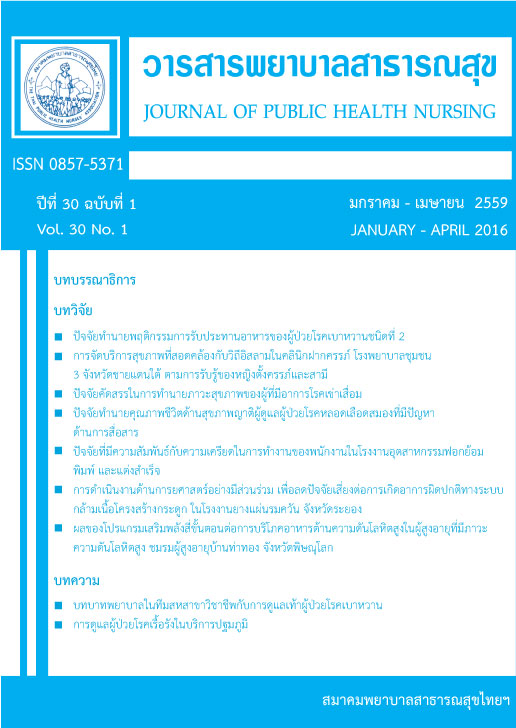ผลของโปรแกรมเสริมพลังสี่ขั้นตอนต่อการบริโภคอาหารต้านความดันโลหิตสูงในผู้สูงอายุ ที่มีภาวะความดันโลหิตสูง ชมรมผู้สูงอายุบ้านท่าทอง จังหวัดพิษณุโลก*
Keywords:
การเสริมพลัง, ภาวะความดันโลหิตสูง, การบริโภคอาหารต้านความดันโลหิตสูง, การรับรู้พลังตนเอง, ผู้สูงอายุAbstract
ผลของโปรแกรมเสริมพลังสี่ขั้นตอนต่อการบริโภคอาหารต้านความดันโลหิตสูงในผู้สูงอายุ
ที่มีภาวะความดันโลหิตสูง ชมรมผู้สูงอายุบ้านท่าทอง จังหวัดพิษณุโลก
อาหารต้านความดันโลหิตสูง มีความสำคัญสำหรับการควบคุมความดันโลหิตโดยเฉพาะอย่างยิ่งในผู้ที่มีภาวะความดันโลหิตสูง การวิจัยกึ่งทดลองแบบสองกลุ่มวัดซ้ำนี้ มีวัตถุประสงค์เพื่อศึกษาผลของโปรแกรมเสริมพลังสี่ขั้นตอนต่อการบริโภคอาหารอาหารต้านความดันโลหิตสูงของผู้สูงอายุที่มีภาวะความดันโลหิตสูง ในชมรมผู้สูงอายุ อำเภอเมือง จังหวัดพิษณุโลก กลุ่มทดลอง (จำนวน 26 คน) ได้รับกิจกรรมเสริมพลัง 4 ขั้นตอน ประกอบด้วย ขั้นสำรวจปัญหา (ระบุและจัดลำดับปัญหา) ขั้นสนทนาทางออก (ทบทวน วิเคราะห์และวางแผนแก้ปัญหา) ขั้นบอกวิธีแก้ (ให้คำมั่นในการปฏิบัติและปฏิบัติตามแผน) และขั้นแชร์ประสบการณ์ (ประเมินความสำเร็จ และแลกเปลี่ยนประสบการณ์) จำนวน 4 ครั้ง กลุ่มเปรียบเทียบ (จำนวน 26 คน) ได้รับเพียงคู่มือความรู้การบริโภคอาหารต้านความดันโลหิตสูงเมื่อเสร็จสิ้นการทดลองเท่านั้น ระยะเวลาศึกษา 12 สัปดาห์ เก็บรวบรวมข้อมูล 3 ครั้งที่ก่อนการทดลอง หลังการทดลองสัปดาห์ที่ 6 และระยะติดตามสัปดาห์ที่ 12 โดยใช้แบบสัมภาษณ์
ผลการวิจัยพบว่าโปรแกรมเสริมพลังสี่ขั้นตอนมีผลต่อการเพิ่มการรับรู้พลังตนเองในการบริโภคอาหารต้านความดันโลหิตสูง (F= 48.49, p-value < .001) และพฤติกรรมการบริโภคอาหารต้านความดันโลหิตสูง (F= 3.588, p-value = .031) โดยหลังการทดลองสัปดาห์ที่ 6 กลุ่มทดลองมีคะแนนเฉลี่ยการรับรู้พลังตนเองเพิ่มขึ้นอย่างมีนัยสำคัญ (Mean difference=3.22, p-value < .001) และคงที่ในระยะติดตามสัปดาห์ที่ 12 ขณะที่คะแนนเฉลี่ยพฤติกรรมการบริโภคอาหารต้านความดันโลหิตสูงเพิ่มขึ้นเล็กน้อยอย่างมีนัยสำคัญ (Mean difference= 0.36, p-value = .001) และคงที่ในระยะติดตามสัปดาห์ที่ 12 เช่นกัน สำหรับกลุ่มเปรียบเทียบไม่พบการเปลี่ยนแปลงอย่างมีนัยสำคัญทั้งการรับรู้พลังตนเองและพฤติกรรมการบริโภคอาหารต้านความดันโลหิตสูงตลอดระยะเวลาการศึกษา ผลการศึกษาชี้ว่าโปรแกรมมีประสิทธิผลโดยเฉพาะการเพิ่มการรับรู้พลังตนเองในการบริโภคอาหารต้านความดันโลหิตสูง ดังนั้น สามารถนำโปรแกรมนี้ไปประยุกต์ใช้ในคลินิกโรคความดันโลหิตและโรคเรื้อรังอื่นๆ ของสถานบริการสุขภาพ อย่างไรก็ตามโปรแกรมเสริมพลังนี้ยังต้องการการทดสอบซ้ำเพื่อศึกษาระดับศักยภาพของโปรแกรมในการปรับพฤติกรรมการบริโภคอาหารต้านความดันโลหิตสูงให้ดีขึ้น
EFFECTS OF A FOUR-STEP EMPOWERMENT PROGRAM ON DASH-DIET CONSUMPTION AMONG HYPERTENSIVE ELDERLY IN THE BANTHATONG ELDERLY CLUB, PITSANULOKE PROVINCE
Dietary Approaches to Stop Hypertension (DASH) diet is important for controlling blood pressure among patients with hypertension in particular. This quasi-experimental two-group design research, with repeated measures, aimed to study the effects of a four-step empowerment program on DASH-diet consumption among hypertensive elderly in the Banthathong Elderly Club, Muang District, Pitsanulok Province. The experimental group (n=26) received four times of the four-step empowerment intervention program consisting of step one - exploring the problem (identify and prioritize the problems); step two - making solution dialogue (analyze the problem and develop a plan); step three - declaring the solution (commit to and act on the plan) and step four - sharing experience (evaluate achievement of the plan and share experience). The comparison group (n=26) received only a booklet on DASH-diet after completing the experimentation. The study period covered 12 weeks. Data were collected at three different time points - at the pretest, at the 6th week posttest, and at the 12th week follow-up by using an interview questionnaire.
The research results showed that the four-step empowerment intervention program affected the increasing of perceived self-empowerment of DASH-diet consumption (F= 48.49, p-value < .001) and DASH- diet consumption behavior (F=3.588, p-value = .031). After the 6th week of experiment, the experimental group had a significant increase in mean score of perceived self- empowerment (Mean difference=3.22, p-value < .001) and the score was still maintained until the 12th week of follow-up period. Whereas, the mean score of DASH-diet consumption behavior slightly increased significantly (Mean difference= 0.36, p-value = .001) and was also stable at the 12th week of follow-up period. There was no significant change in both the perceived self-empowerment and the DASH-diet consumption behavior in the comparison group during the study period. The research findings indicated that the intervention program was effective, especially for improving the perceived self-empowerment of DASH-diet consumption. It could therefore be applied in hypertension and other chronic-disease clinics in the health care settings. However, this program still needs to further study to retest its potential level for improving the DASH-diet consumption behavior.
Downloads
Published
How to Cite
Issue
Section
License
บทความที่ตีพิมพ์และแผนภูมิรูปภาพถือเป็นลิขสิทธิ์ของวารสารพยาบาลสาธารณสุข (Thai Public Health Nurses Association)







